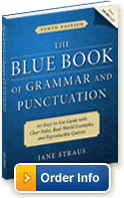|
Welcome to your GrammarBook.com E-Newsletter.

|
"You taught me the difference between whoever and whomever in a way I could understand and remember."
— Daryl L.
"I forwarded your website address to several of my grammar-obsessed friends and they are hooked."
— Sedrick H.
"Your E-Newsletter grammar tips are a great help."
— Desiree G.
|
|
|
Leonard’s Ten Commandments
The writer Elmore Leonard, who died last week at 87, was the master of hard-bitten prose. He started out as a pulp novelist, and went on to transcend the genre. Since the mid-1950s, more than forty of his works have been adapted for movies and TV, many of them featuring such A-listers as Paul Newman, Clint Eastwood, Robert De Niro, and George Clooney. In his obituary, the Associated Press called the longtime Michigan resident “the Dickens of Detroit, the Chaucer of crime,” and said, “Few writers so memorably traveled the low road."
The author’s seemingly effortless low-key, economical technique, with its affably nasty edge, has been the envy of many an aspiring novelist. In 2001, he wrote an article for the New York Times that contained ten rules for fiction writers. Anyone interested in the art and craft of writing is urged to seek out this compelling document online. Today we’ll deal with a couple of Leonard’s precepts.
Rule Three: “Never use a verb other than ‘said’ to carry dialogue.” This is good advice for essayists and journalists, too. Many writers worry that repeating “said” will make them look bad. So they start substituting words like “grumbled, gasped, cautioned, lied” before reaching the end of the line (and of Leonard’s patience) with eyesores like “asseverated.”
Leonard is stressing that the quote is what matters, and “the verb is the writer sticking his nose in.” As William Zinsser says in his fine guide On Writing Well, “The reader’s eye skips over ‘he said’ anyway, so it’s not worth a lot of fuss.”
Which leads to Rule Four: “Never use an adverb to modify the verb ‘said’…To use an adverb this way (or almost any way) is a mortal sin.” Many great writers have a similar disdain for adverbs. Mark Twain said, “Adverbs are the tool of the lazy writer.” Stephen King, another novelist who has achieved beyond his pulp pedigree, once wrote: “I believe the road to hell is paved with adverbs.”
Some will be puzzled by this. But how is The town was completely destroyed or basically destroyed an improvement on The town was destroyed? When you become aware that in most cases, the likes of basically, completely, actually, definitely, and very are unnecessary, you start to understand adverb abhorrence.
One note about very: the distinguished journalist and author William Allen White (1868-1944) once called it “the weakest word in the English language.”
Due to the E-Newsletter's large readership, please submit your English usage questions through GrammarBook.com's "Grammar Blog." |
|
Pop Quiz
Despite Elmore Leonard’s commandments, some writers may prefer variations on “said” at appropriate times. There are no right answers to this quiz, but with Mr. Leonard in mind, rewrite any sentence below as you wish, and see if your instincts for staying out of the way of a good story are akin to ours.
1. Bob turned to Mary and offered, “You are the loveliest woman at the party.”
2. “I came here today and saw a whale,” she explained.
3. “Why are you here?” he asked.
“To see you,” I replied.
4. “Why, what a jolly surprise,” he smiled.
5. “Who is equivalent to he, and whom is equivalent to him,” I explained.
Free BONUS Quiz For You!
[[firstname]], because you are a subscriber to the newsletter, you get access to one of the Subscription Members-Only Quizzes. Click here to take an Apostrophes Quiz and get your scores and explanations instantly!
Follow-up: Did Last Week’s Newsletter Literally Change Google?
Last week, we took Google to task for redefining the word literally. Try typing “literally” into Google now. The company overhauled its misbegotten second definition, and prefaced it with “informal.”
We also upbraided Google for not capitalizing the first word of the following sentence (reprinted here exactly as it occurred): “the driver took it literally when asked to go straight over the traffic circle”. And, we scolded, placing a period outside quotation marks is never done in formal American writing.
Guess what: A day or two after our newsletter went out, the offending period was nowhere to be found—neither inside nor outside the quotation marks. Deleting that period also makes it unnecessary for Google to capitalize the first letter of the quote. Coincidence? We doubt it. We think the people at Google heeded our article, and we say hurrah for them.
Thanks to all of you who sent in comments. We will post them along with our responses where appropriate in the Grammar Blog section of the GrammarBook.com website.
Teachers: We Need Your Help
This request is to all you teachers who use The Blue Book of Grammar and Punctuation in your classes. We are pleased to let you be the first to know that the newly revised, expanded, and reimagined eleventh edition of The Blue Book will be released in February 2014! The publisher would like to include short endorsements of the book, written by classroom teachers, on the back cover. Please submit your endorsement, which needs to be just a sentence or two, to info@grammarbook.com by September 4, 2013. For the endorsements that are selected, in addition to your name appearing with your endorsement, we will send you a complimentary hard copy of the eleventh edition. Simple guidance for writing an endorsement can be found here. Thank you!

"So convenient...hundreds of quizzes in one click."
[[firstname]], Subscribe to receive hundreds of English usage quizzes not found anywhere else!
- Take the quizzes online or download and copy them.
- Get scored instantly.
- Find explanations for every quiz answer.
- Reproduce the quizzes to your heart's content.
- EASY to use.
- No software to download.
- No setup time.
- A real person to help you if you have any questions!
"Fun to test my skills!" "The explanations really help...thanks!"
Your choice: Subscribe at the $29.95 or $99.95 level ($30 off - regularly $129.95).
"I download the quizzes for my students who don't have computer access."
Subscribe today to receive hundreds of English usage quizzes not found anywhere else!
"Makes learning English FUN!"
 |
Don't need all the quizzes at once?
You can now purchase the same quizzes individually for ONLY 99¢ each. Purchase yours here. |

Get Yours Today!
Get Amazon’s #1 Bestseller in Four Categories!
#1 in Grammar
#1 in Reading
#1 in Lesson Planning
#1 in Vocabulary |
The Blue Book of Grammar
and Punctuation by Jane Straus
An indispensable tool for busy professionals, teachers, students, homeschool families, editors, writers, and proofreaders.
Now available in print AND as an e-Book! Over 2000 copies are purchased every month!
Order Your Copy Today!
- Hundreds of Grammar, Punctuation, Capitalization, and Usage Rules
- Real-World Examples
- Spelling / Vocabulary / Confusing Words
- Quizzes with Answers
|
View the entire contents online
Discounts available for schools, bookstores, and multiple copies. Order Today!
 Wordplay Wordplay
These are reported to be quotes from Lawrence "Yogi" Berra, baseball Hall of Fame catcher who played for the New York Yankees for nineteen years.
On why he no longer went to Ruggeri's, a St. Louis restaurant:
"Nobody goes there anymore because it's too crowded."
I always thought that record would stand until it was broken.
When giving directions to Joe Garagiola to his New Jersey home, which is accessible by two routes:
"When you come to a fork in the road, take it."
Pop Quiz Answers
1. Bob turned to Mary and said, “You are the loveliest woman at the party.”
2. “I came here today and saw a whale,” she said. (Be careful with explained. In this sentence, nothing is “explained”; it’s just a statement of fact.)
3. “Why are you here?” he asked.
“To see you,” I replied. CORRECT
4. “Why, what a jolly surprise,” he said. (Have you ever heard anyone smile?)
5. “Who is equivalent to he, and whom is equivalent to him,” I explained. CORRECT
Learn all about who and whom, affect and effect, subjects and verbs, adjectives and adverbs, commas, semicolons, quotation marks, and much more by just sitting back and enjoying these easy-to-follow lessons. Tell your colleagues (and boss), children, teachers, and friends. Click here to watch. |





 Wordplay
Wordplay
